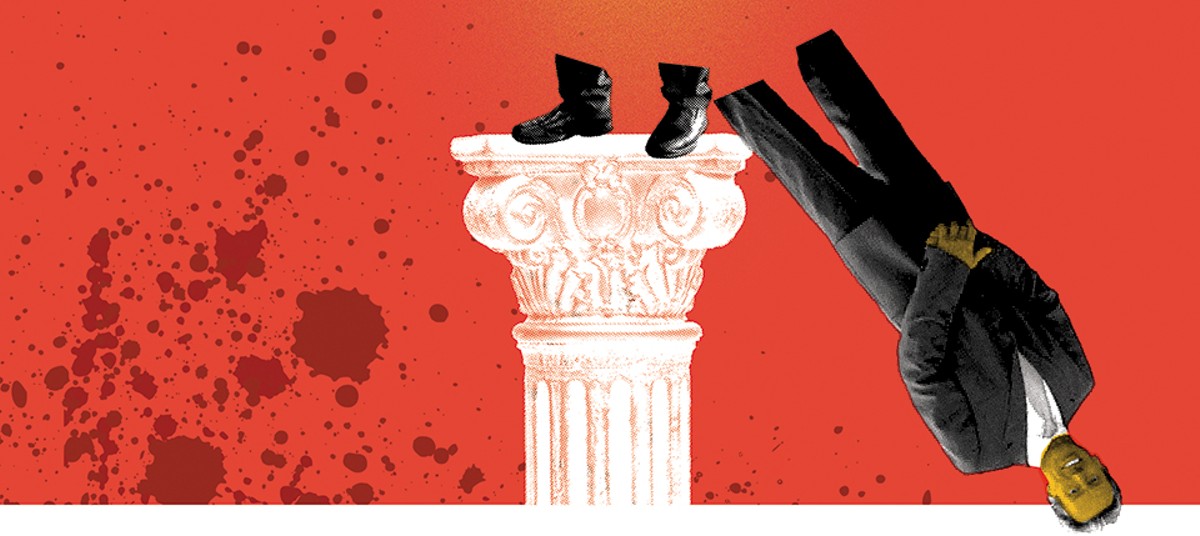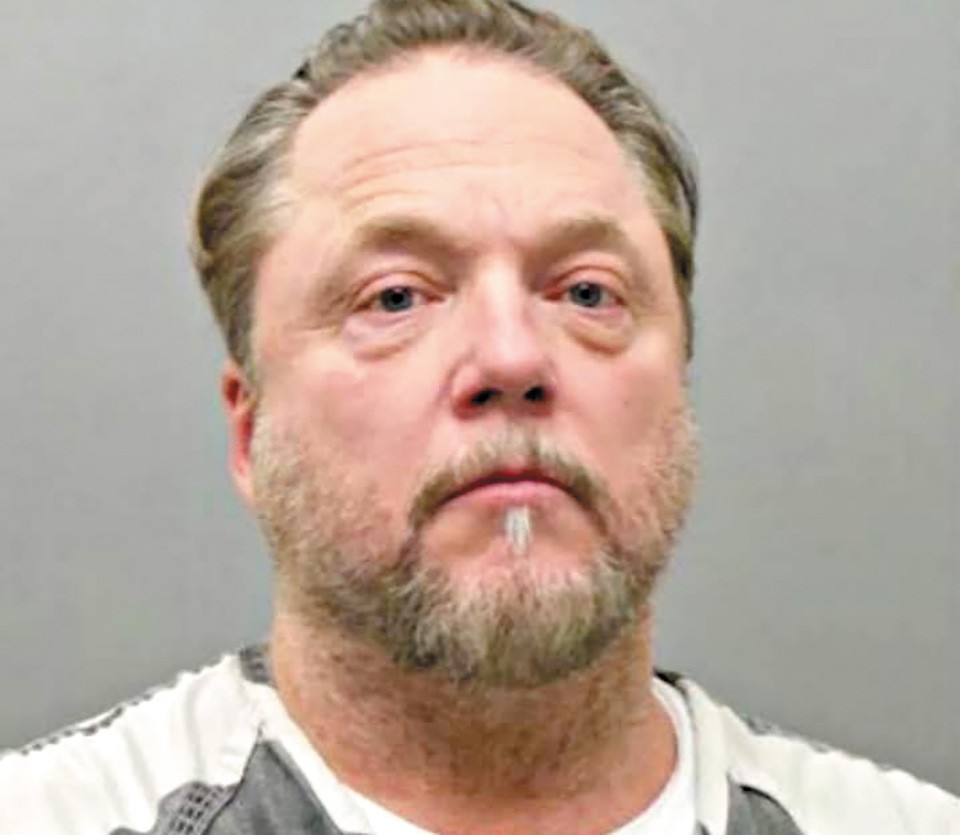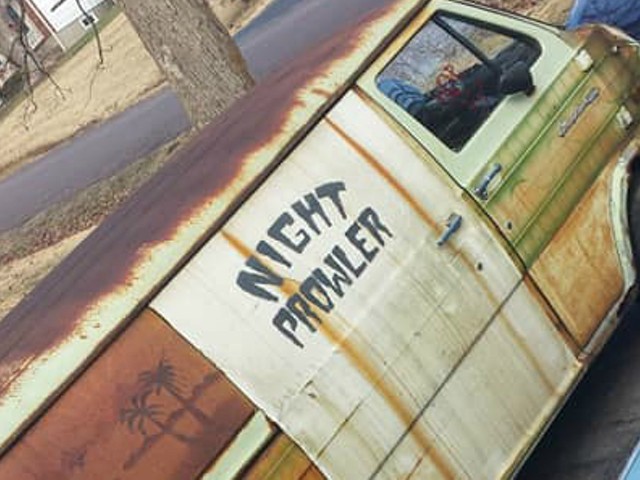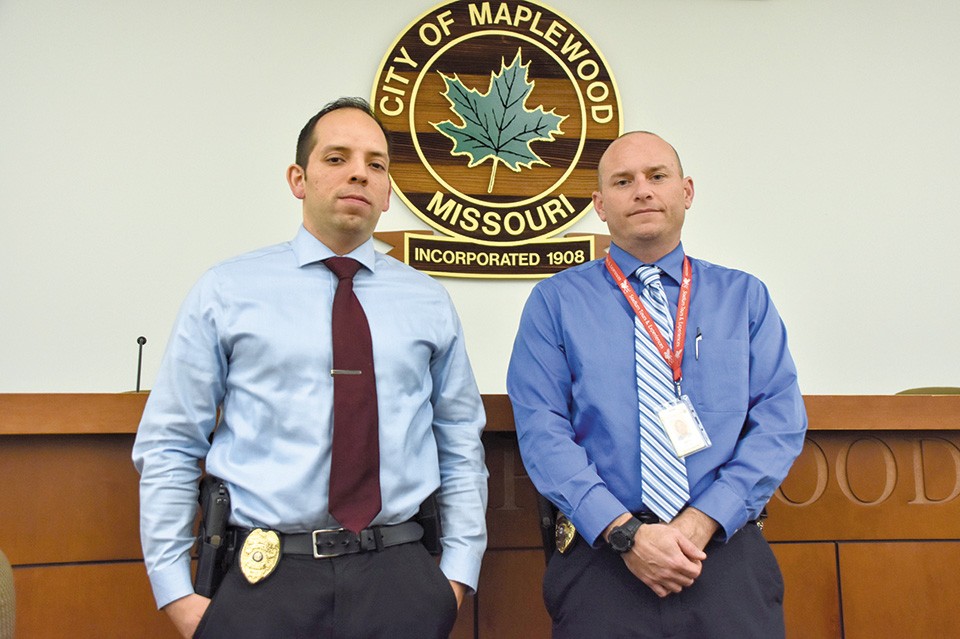
Early on the morning of December 1, 2016, an FBI special agent and a St. Louis city police officer sat in an unmarked Dodge Charger outside a house in Fenton. Beckman's ex-wife lived there with their two young kids, and he stayed over some nights.
Shortly after sunrise, the special agent and the cop watched as Beckman walked out and got in a white Subaru. They carefully trailed him to a convenience store and then a condo he used as a bachelor pad.
As he walked toward the front door, they popped out of the Charger, shouting "Police! Police!"
Beckman, seeming a little dazed, continued to fumble with a keypad on the door until the two-man crew tackled him onto the front yard, pinning him face down in the grass. Two more task force members swooped in and secured his wrists with handcuffs.
Similar scenes played out across the St. Louis metro as teams of law-enforcement agents picked off the kidnappers one by one. By mid-morning, only Roades was unaccounted for.
The suspects were driven to the DEA's local headquarters, where Maplewood's LeClerc and Brown were preparing for interrogation.
Neither man had handled a kidnapping case before, but they knew their way around an interview room.
"As detectives, if there are multiple [suspects] involved, you think about who is the weakest, who is going to talk to you," LeClerc says.
"Who's going to fold first," Brown adds.
They soon discovered they were not dealing with the toughest of criminals. Blake, the aspiring big shot, started to cry. Caleb folded, too.
The detectives had figured they would get little from Beckman. A big-time corporate executive like him was almost guaranteed to call in an attorney, a good one, after about three seconds.
Instead, to their delight, he talked for three hours.
"He just couldn't help himself," Brown recalls. "We just let him talk. He kept digging himself deeper and deeper in the hole."
They led with a good cop/good cop routine. Beckman was pissed about having his face mashed in the ground that morning, but these two detectives seemed OK.
"Interesting start to the day, huh?" LeClerc offered.
Before they knew it, Beckman was rattling on about his busy schedule, chatting about a female employee on her way to his place that morning and the go-kart racing expert from Los Angeles he was flying in that afternoon to coach his kids. He asked whether the police had secured the two money clips he had been carrying when arrested. He also had two cellphones — make that three cellphones.
"That's my girlfriend phone," he added slyly.
"Oh, ho, man," laughed Brown. "I love it."
As Beckman continued to loosen up, they began to ask him about various players in the case. Blake was a "great kid," Beckman said, but he knew little about his brother, Caleb.
"Well, let me throw another name at you," Brown said, "Ellis Athanas."
Beckman shook his head.
"No dealings with him?" Brown asked. "Nothing like that?"
"No."
But a few minutes later, Beckman's memory improved: "What's his name again?"
It was soon coming back to him. Athanas was the kid who burglarized Blake's house, he recalled. Yes, in fact, Beckman had tried to help negotiate a solution, agreeing to take the title to Athanas' car, sell it and give Blake the money to settle the debt. He even remembered meeting for beers with Athanas' father to make it happen, he said.
In his telling, Beckman was simply a peacemaker trying to help out his young friend, who'd had his house burglarized.
"He called me freakin' crying on the telephone that he'd lost everything," Beckman told the detectives.
Brown and LeClerc listened, silently cataloging the admissions that corroborated what they already knew. After about 40 minutes, they began to turn up the heat.
"You're not being straight up with me on Ellis," Brown told him.
He and LeClerc began to lay out the details of the kidnapping, torture and ransom payments. They questioned him about the pole in Blake's basement, the shipping container. If Beckman was under the impression the detectives had been blindly lobbing questions, they were now deliberately showing him that they'd done their homework.
"Todd, how do I know all this?" Brown asked about an hour in.
Investigators had already collected video from Lowe's of Beckman buying shrink wrap and a heat gun on the second day of the kidnapping. They had run the GPS on Athanas' phone showing him in Blake's basement, they told him, and they would soon do the same to Beckman's phones. His smartest move would be to start telling the truth, they said.
Beckman then admitted he had seen Athanas in the basement. He told the detective he had advised Blake to make a "citizen's arrest" after the burglary. Athanas was a "shithead" who "would have got it sooner or later," Beckman added, but he insisted he never hurt the 24-year-old. "I'm the nicest freaking guy you'll ever meet."
Yet even as Beckman tried to minimize his role, he admitted to key parts of the narrative: He was at the scene of the crime, he had negotiated ransom payments over beers with the hostage's dad and he'd advised Blake to snatch — "citizen arrest" — Athanas.
Incredibly, Beckman was not done cooperating even after the interview ended. He signed consent forms for investigators to search his condo and Subaru, leading them to discover the handgun he used to pistol whip Athanas. He even accompanied police to his office in Fenton. His attorney, Travis Noble, met them there on Champion Drive.
"I think in Todd's mind, it wasn't a kidnapping," Noble later tells the RFT. "It was, 'We grabbed a guy who stole from us and we want our stuff back.'"
Beckman certainly conducted himself as a guy with nothing to hide, even as federal agents piled up crucial evidence. He led them to the safe in his office where he had stored $5,000 of the ransom money. And he suggested where they might find the keys to a certain TanCo van that seemed of particular interest. While they searched, he picked up a glass, poured himself a belt of vodka and gulped it down. Noble, left with little else to defend his client, later argued that the investigators had let his client get drunk, asking a judge to throw out any statements Beckman made to the Maplewood detectives. But it was already too late. Davis, the federal prosecutor, successfully pointed out that Beckman gave his long-winded interview before he did any drinking. The statements were fair game, the judge ruled.
As an added bonus that day at Beckman's office, investigators discovered Kerry Roades milling around outside and took him into custody as well. LeClerc and Brown tried to interview him, too, but he was clear: He wanted an attorney.
Everyone pleaded guilty. They quibbled about a few of the details in a list of facts composed for each plea hearing — Beckman said he couldn't remember pistol whipping or dry-firing the gun against Athanas' head, Roades claimed he wasn't part of the torture — but they had been caught. Even Zachary Smith, the 24-year-old who dropped by Blake's during the kidnapping, admitted he failed to report a serious crime and was ordered to serve fifteen months behind bars. As part of the plea deals with the four main defendants, Davis agreed to recommend sentences of no more than twenty years in federal prison.
Caleb Laubinger, who had been pulled into the incident by his younger brother, fared the best. U.S District Judge Audrey Fleissig gave him five years and ten months. Blake's attorney, Rosenblum, made a compelling case during his sentencing that his client had been manipulated by his mentor after a childhood of abuse.
Fleissig described the actions of the four as among "the worst conduct I've had to deal with in my time as a judge," but she agreed that the kidnapping and horrific beatings seemed far beyond Blake's nature. She sentenced him to six and a half years.
"I would truly like to say sorry for what I did," Blake told the judge, fighting back tears. "I wish I could take it back."
Roades also apologized, but Fleissig was less merciful. Davis had long considered the mechanic the savviest of the four — the "alpha criminal" in a crew of amateurs. He notes that Roades was careful to position himself behind Athanas, out of his sightline, during the attacks. Unlike the others, he never talked to investigators.
"Kerry pretty much stonewalled it until the end," Detective Brown says.
Athanas testified that it was Roades who suggested they chop him up and shrink wrap the pieces to ship to California. And yet friends and neighbors wrote passionate letters to Fleissig, begging her to have mercy on him. An Arnold cop who lived in the same subdivision as Roades and Beckman claimed that his two neighbors had little do with each other outside of their business dealings.
"I can't stress enough that Kerry is truly one of the good people," the veteran officer, Jason Valentine, wrote. "I have seen him work hard every day of the week providing for his family, and at the end of a long day, it was not unusual to look out my window and see him mowing my lawn."
Fleissig sentenced Roades to ten and a half years in prison. Only Beckman received the full twenty years recommended by prosecutors.
His daughter, the oldest of his three kids, gave a speech that Davis would later describe as "gut-wrenching," attesting to the kindness of her father and the way he could motivate a roomful of people. He had been arrested on the day of her engagement party and was still locked up when she got married. Beckman listened quietly. His tan had faded after more than a year in jail, and his dark hair was going gray at the temples but was somehow still perfectly styled.
Fleissig noted that while he clearly cared for his own children, he showed no mercy to the parents of Athanas.
"I have never seen a case like this," the judge said. "I have seen cases where some horrible things took place, but short of somebody shooting or killing somebody, I have never seen a case in this court where a defendant has elected to abduct, detain, threaten, terrorize a person and then turn around and threaten and terrorize that person's parents."
Beckman didn't even need the money, Fleissig added. He had "millions in assets," according to court filings, yet he tormented his victim for three straight days.
"It is one of the most violent and callous series of facts I have ever run into as a judge," Fleissig said.
Left unanswered was why.
"If you figure that out, let me know," Beckman's attorney Noble says in a phone interview.
The two men knew each other for years. They met when the lawyer helped Beckman out of a drunk-driving charge and later continued to run in some of the same social circles. In many ways, Noble says, he could relate to Beckman. Neither grew up with money, and when they finally accumulated some, it could be hard to resist spending it in dumb, showy ways. Always the best-dressed attorney in the courtroom, Noble, like Beckman, owned Lamborghinis for a time; they were in the same luxury-automobile club.
Early on in the case, Noble suggested that nobody who could afford a $250,000 car was going to risk everything he had for a $27,000 ransom over some stolen weed. But as it turns out, Beckman did exactly that. Noble still can't figure it out.
"This case is the one case that keeps you up at night," he says.
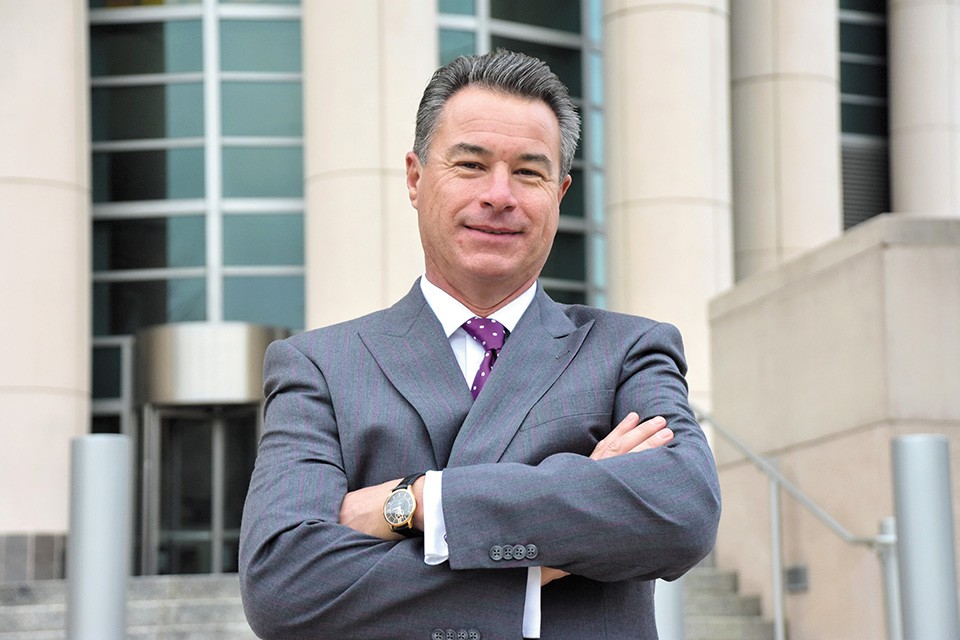
Davis, the prosecutor, will remember it, too. He has no idea why Beckman did what he did. Unlike the movies, major dealers regularly write off losses of three or four times the amount stolen by Athanas as a cost of doing business, he says. The risk that comes with violence simply is not worth it.
"Their cost-benefit analysis was way off," Davis says.
He sees Beckman as a wealthy businessman who thought the rules no longer applied to him. Davis describes himself as a staunch believer in the social contract, the idea that we as a society are all better off when we collectively agree to do the right thing. The drug dealers or kidnappers or child pornographers who pass through the courtrooms operate outside of that contract.
"It just doesn't sit well with me," he says.
On the day of Beckman's sentencing, Davis was hanging out with the federal agents and cops who investigated the case, waiting for proceedings to start. The hearing had been a long time coming, and as they all piled into the elevator, Davis began telling the story of seeing that BMW with the TANCO plates a half-dozen years ago on I-64. Just as they reached their floor, he got to the part about how he said he was going to get that guy one day.
The elevator doors opened. Davis looked out.
"And guess what today is."
Editor's note: A previous version of this story provided inaccurate information about where John Davis glimpsed Todd Beckman speeding approximately six years ago. It was I-64, not I-44. We regret the error.

